I'm Amanda and I’m passionate about creating a well loved and well lived in home for my family and I I'd love to help you do the same!
learn more...
hey there!
Shop
Shop
Shop
HOME
style
spring
let's connect
get on the list
never miss out.
get exclusive tips, news & free resources!
Enroll Now!
shop ART
Should you choose marble countertops? If you are trying to decide if you should install marble counters, I feel for you! It’s not a simple decision. We installed honed Carrara marble countertops in our kitchen 10 years ago and our kitchen is heavily used by the whole family including two kids. Functionality and durability were definitely priorities for us when we made the decision to install marble. The way marble counters look was not the only factor considered, but they sure are pretty…here is my honest review after a decade of living with marble counters.
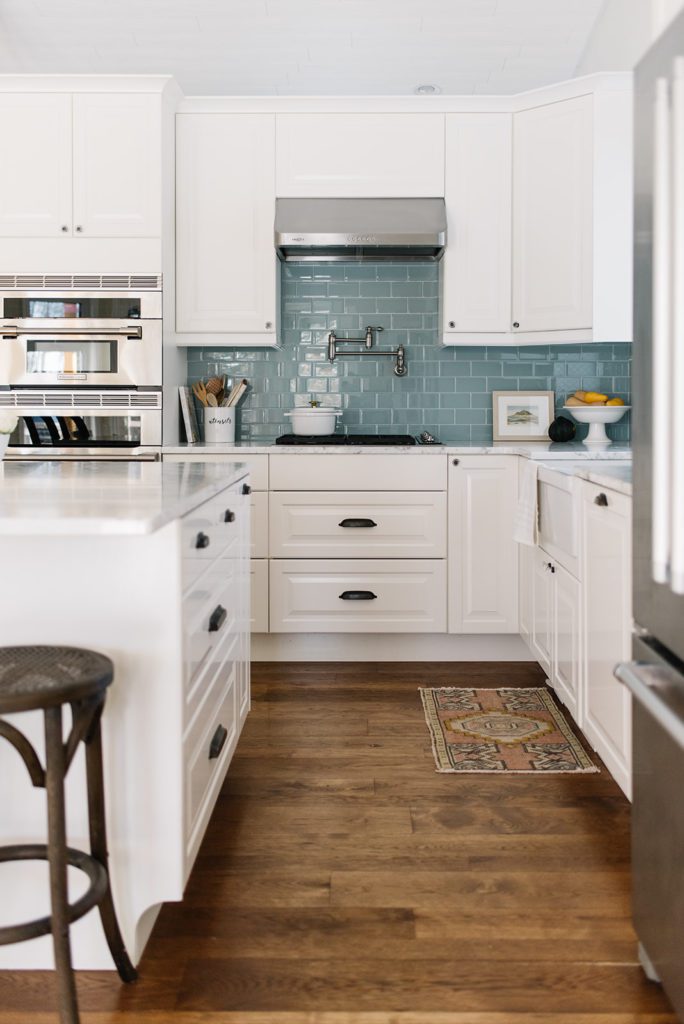
Estimated reading time: 11 minutes
Note: This post may contain affiliate links that won’t change your price but may share some commission.
Table of Contents
What do Marble Countertops Look Like?
Marble countertops are usually white or off-white with grey, gold or brown veining running through the stone. There are lots of faux marble options on the market now, but none of them can quite compare to the beauty of the real thing.
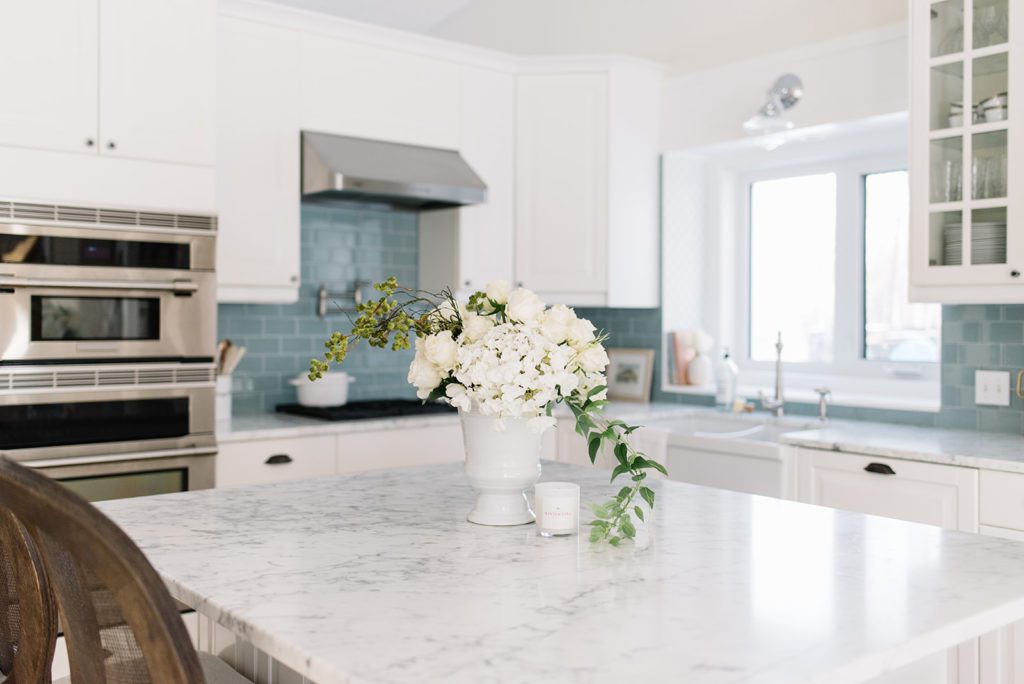
Common Types of Marble Countertops
Carrara marble is one of the most commonly used marbles and it’s what we chose in our kitchen. With a pretty grey veining, it was just what we were looking for aesthetically. It’s named for Carrara, Tuscany in Italy where it’s quarried. We chose to install honed Carrara marble on both our kitchen island and back countertops.
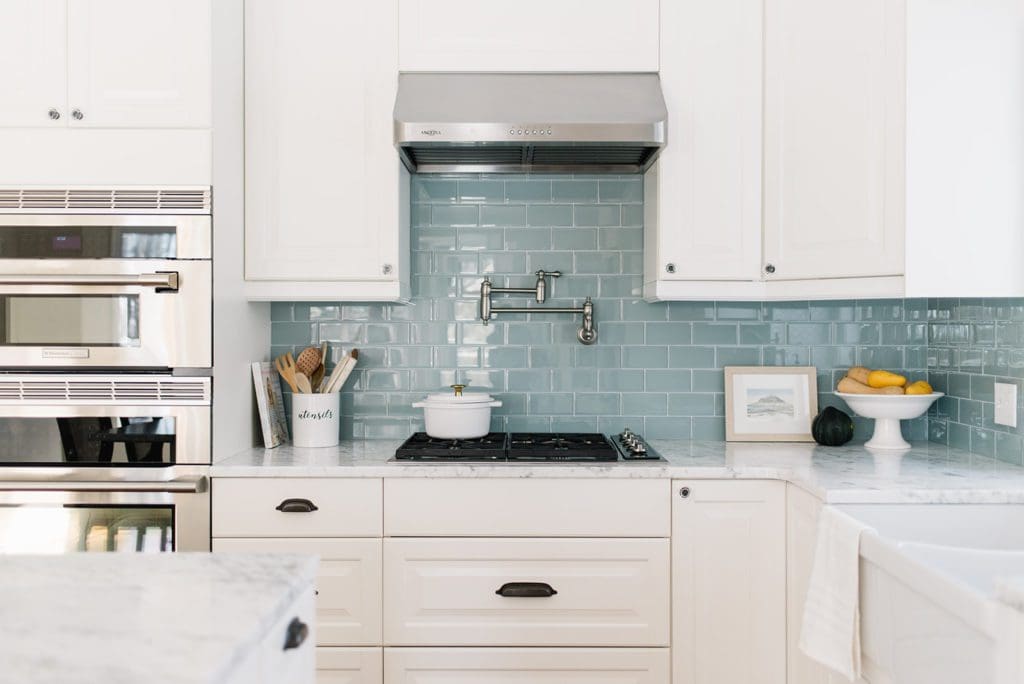
Marble comes in a variety of colours, but we usually think of white marbles like Carrara or Calcutta, which is what I’ll focus on in this post. Calcutta marble looks similar to Cararra marble, but it has a slightly more crisp white background with darker veining and it’s more expensive than Carrara marble.
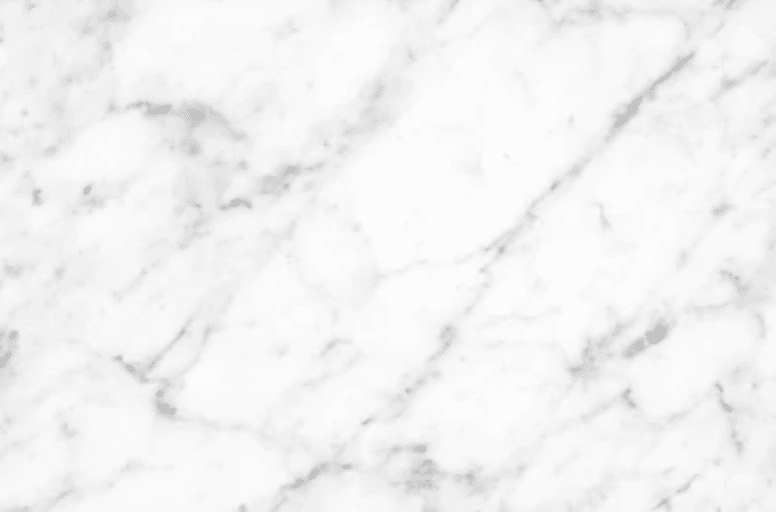
Cararra marble has a softer grey veining.
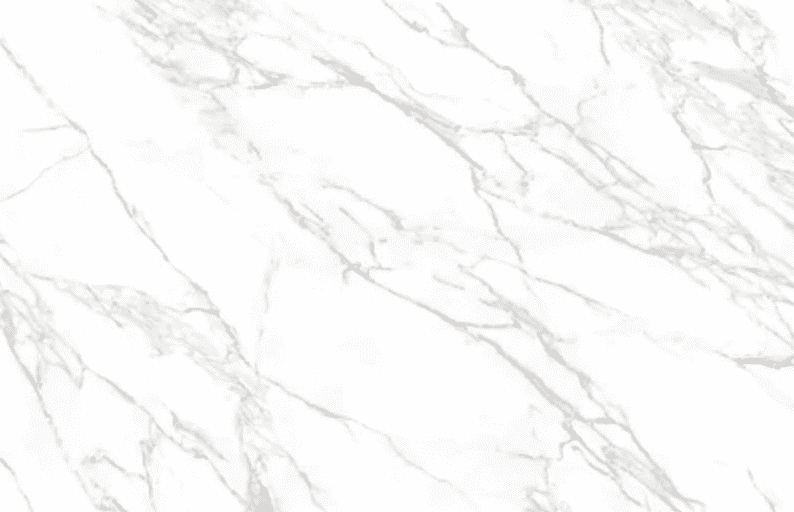
Calcutta marble is a crisper white with bolder veining.
You can see an example of Calcutta Gold, one of my favourite marble varieties in this gorgeous kitchen renovation. Calcutta Gold has, as the name implies, a beautiful golden veining and is perfect for spaces that need a warmer finish.
Marble Countertop Characteristics
POROSITY & PERMEABILITY
Marble is both porous and permeable. This means that it is full of tiny holes and it will transmit fluids through it. So if you spill red wine on your beautiful marble countertop, it WILL stain!
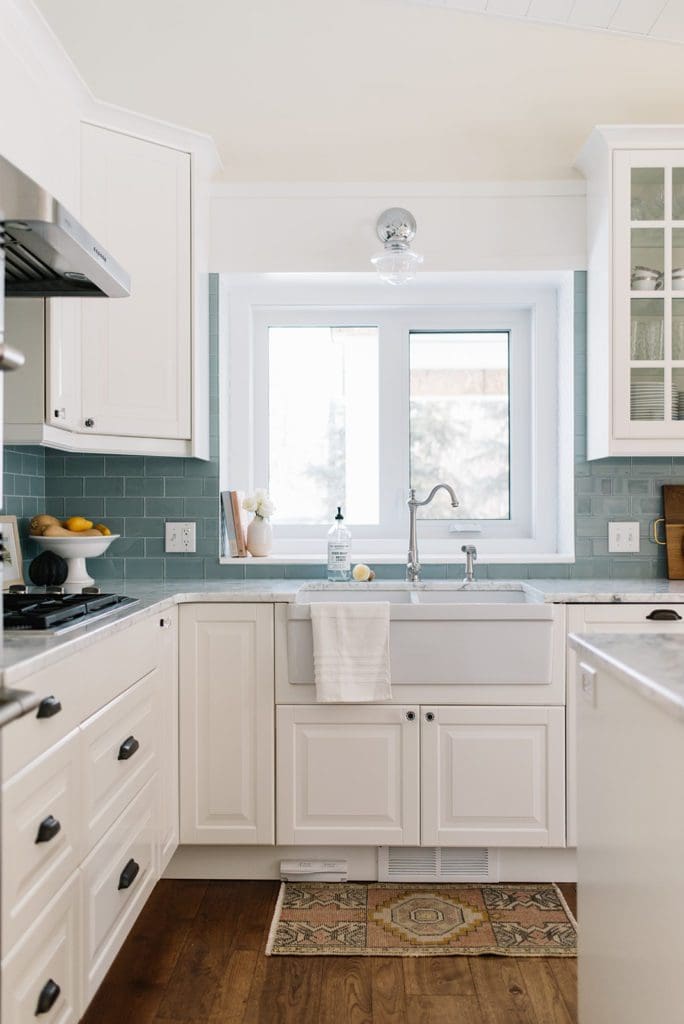
TEMPERATURE
Because marble is a dense stone it is a good conductor. This means it will draw heat out of a warm object like your hand or dough and dissipate it quickly. That is why marble always feels cold. It is technically heat resistant, but it’s still a good idea to use coasters when placing hot objects directly on it to prevent scratching, scorching or cracking.
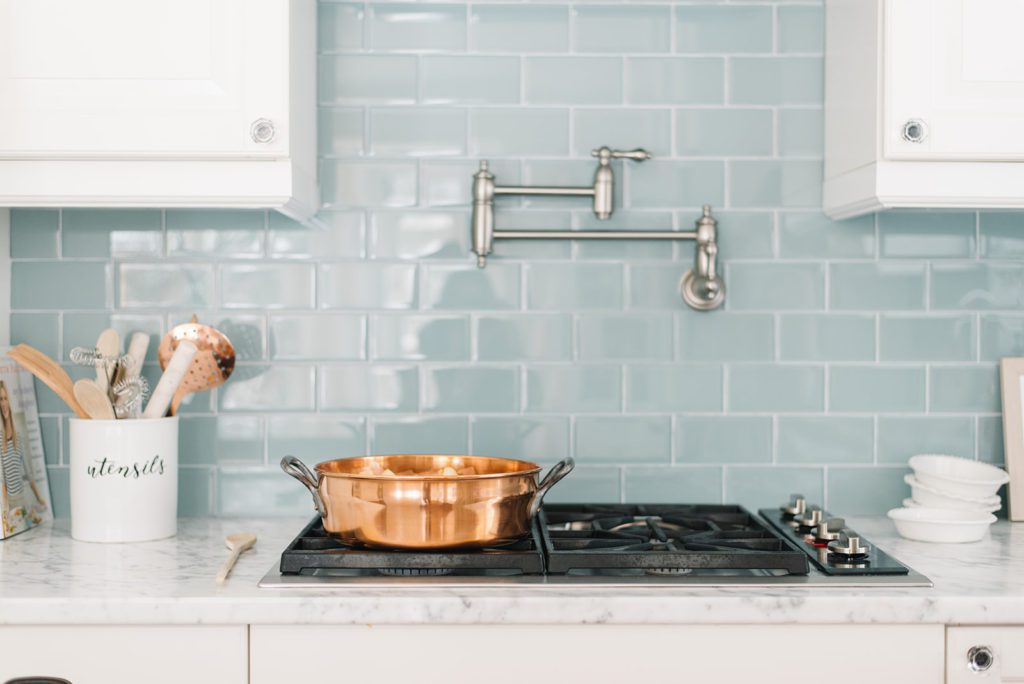
We’ve noticed that frozen meats thaw more quickly and that fruits and veggies ripen faster when placed on the marble and it’s great for rolling out dough and making pastry.
Although marble is heat resistant, I don’t place hot pans directly onto my counters. It is more likely that you would scratch the counter rather than scorch or crack it, but I don’t take any chances!
DURABILITY
HARDNESS
Marble is hard and dense, but it will chip like any natural stone. Even though it is hard, it is also porous so it will stain and etch easily.
Marble is interestingly an extremely hard stone, but easily damaged at the same time. The edges of our marble countertops that extend over our farmhouse sink have a couple of chips from unfortunate incidents involving large pots and pans. Marble also scratches easily and the smallest infraction will leave a mark.
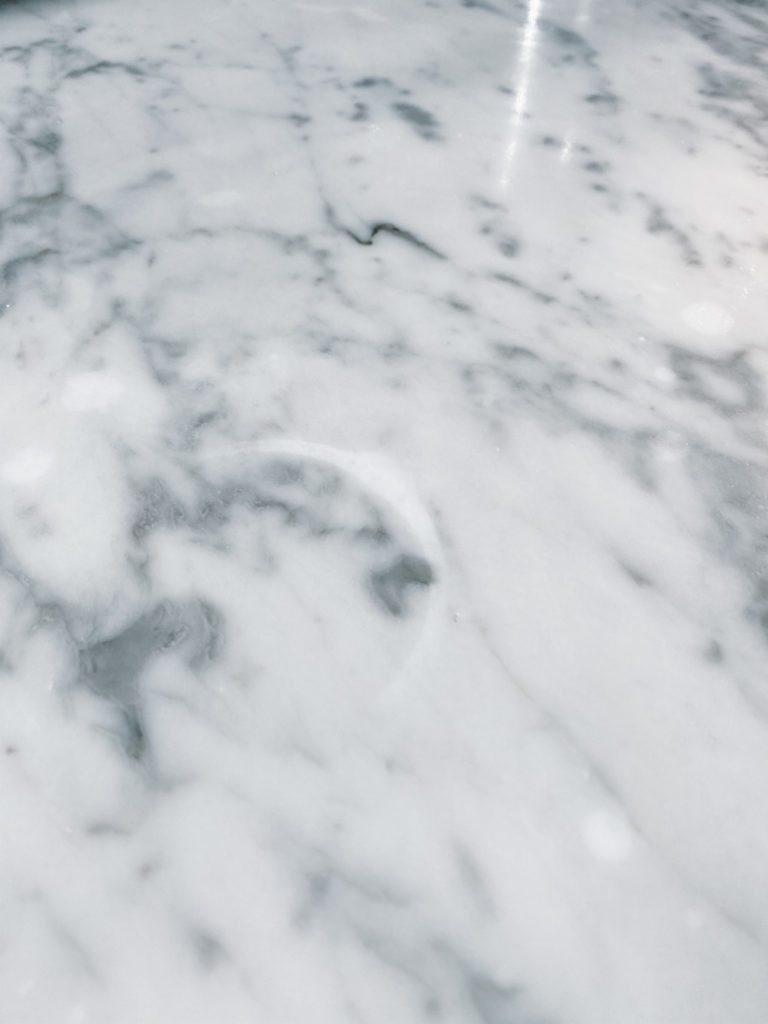
Above is an example of a mark left by a water glass. We have many of these as we usually forget to use coasters. There are a few scratches beside it as well, but they are harder to see in photos.
ETCHING
Etching describes the physical change that occurs when acid interacts with the calcium carbonate composition of marble. An etch mark looks like a dull spot and the area that is etched will be more susceptible to stains and scratching.
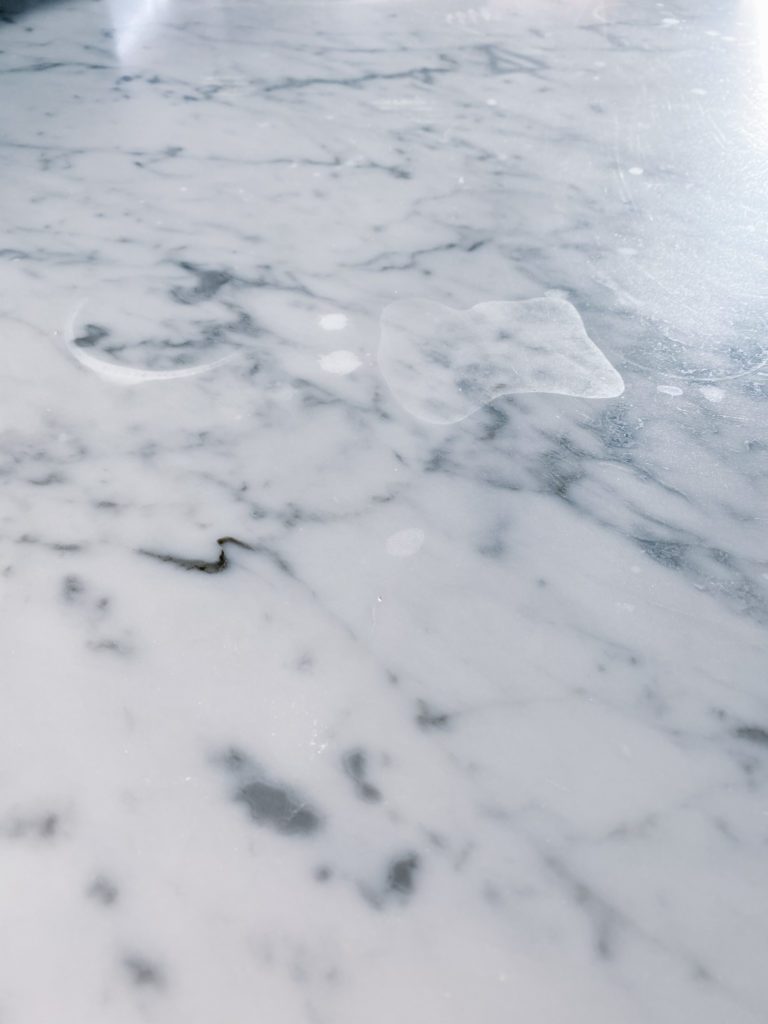
Above is a beautiful example of a big ‘ol etch mark. Do you see a piece of toast in this picture?! That’s an etch mark from a glass of orange juice that was spilled. The orange juice was so acidic that we couldn’t wipe it up fast enough to prevent it from etching immediately. (If we sealed our counters regularly the damage might not have been as bad…more on that below.)
MARBLE COUNTERTOP SURFACE TYPES
There are two types of finishes to choose from when installing marble countertops: honed or polished…
A honed finish is created by sanding the surface so that it has a matte appearance. Honed marble won’t show scratches or etching as much as polished, but it will stain more easily.
A polished finish is shiny and glossy. This finish won’t stain as easily, but it will show scratches and etchings, especially in bright sunlight. Polished surfaces will also wear over time.
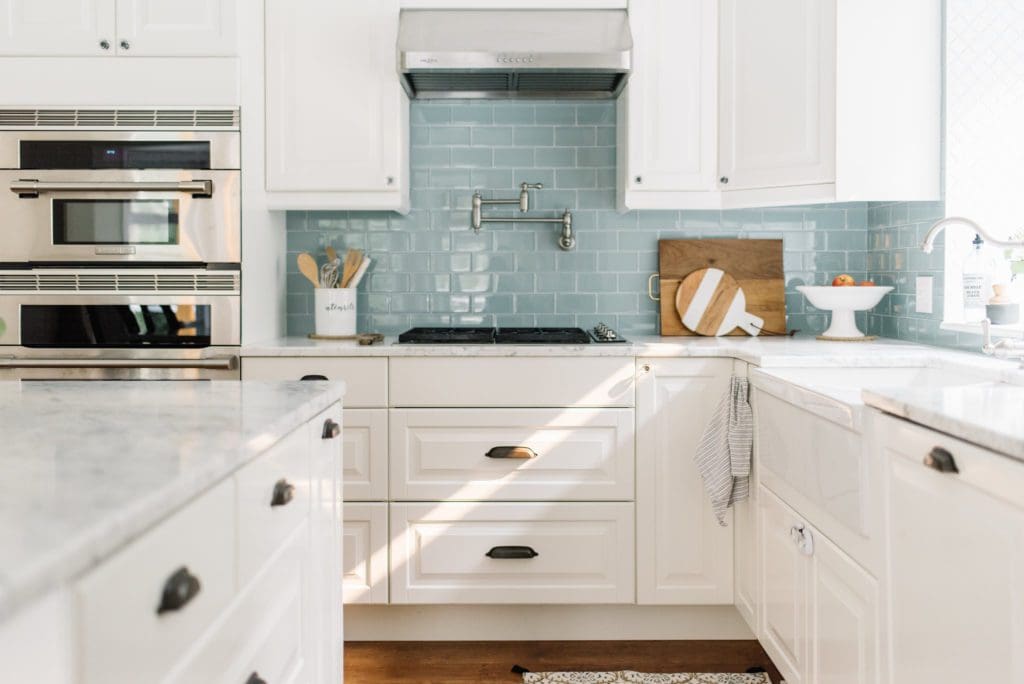
We knew that our countertops would be heavily used, so we chose a honed finish. Staining could be prevented by avoiding leaving spills on the counter for long periods of time etc.. but scratches and etching were inevitable with regular use.
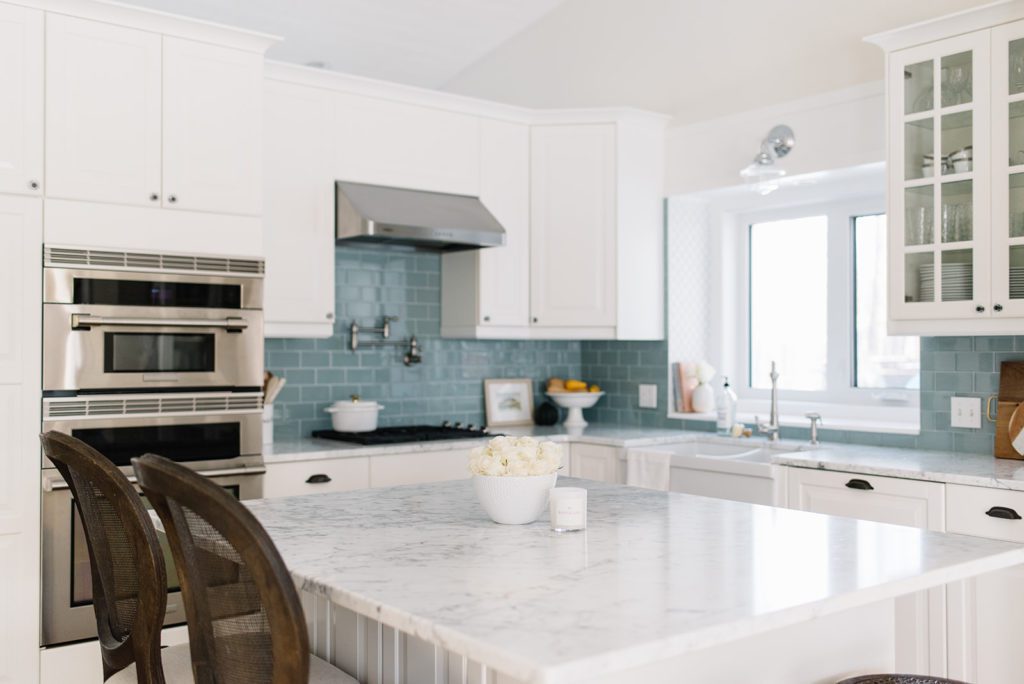
We chose to embrace the natural patina that marble acquires over time! You see gorgeous marble counters in old French farmhouses that have been lovingly used for generations. The stone is wonderfully worn and they let it age naturally.
How to Care for Marble Countertops
Marble should always be sealed professionally when it’s installed. Then it should be sealed again every 6 months to 1 year depending on usage and how fast the sealant is wearing.
Marble should be cleaned regularly with a non-acidic cleaning solution and a microfiber or other soft cloth. I don’t like to use chemical cleaners in my home so the following is a DIY cleaning solution that works well and is safe to use on marble!
A Natural Marble Cleaning Solution
- 16 oz amber spray bottle
- 1 tsp Thieves dish soap
- 1/2 C rubbing alcohol
- Top with distilled water
- 10 – 20 drops of essential oil (I like to add Lemon or Tangerine)
Note:
Acidic liquids like lemon juice will etch the surface of natural stones, but citrus essential oils are pH-neutral and safe to use! For more information on using non-toxic products in your home check out how to start using essential oils and how to clean your home without toxins.
Marble Countertop Pros and Cons
So we’ve gone over the basics, now it’s time to start thinking about whether or not marble is right for you! I find a good old-fashioned pros and cons list is the best way to hash it out!
PROS
#1 BEAUTY
Nothing quite compares to the natural beauty of real marble. There are some really nice man-made and composite products on the market. And there are so many more choices in countertop material now than there were even a few years ago! But if you are a die-hard marble lover nothing else quite measures up!
#2 TEMPERAMENT
Marble has a lovely cool surface, which is ideal for baking and especially pastry making.
It’s also heat resistant, which means that it shouldn’t melt or crack if you accidentally put something hot down. ( Again, I wouldn’t recommend pushing your luck and doing this too many times!)
#3 COST
Marble can be cost-effective depending on what you choose! It can sometimes cost less to put in a Carrara marble countertop than granite or quartz.
#4 LONGEVITY
Marble is a classic. The ancient Greeks loved it and we still love it now! It will never go out of style and is a safe investment.
CONS
#1 HIGH MAINTENANCE
Without or even WITH proper care, marble will etch, scratch, stain, and chip! If your marble isn’t sealed properly, even a glass of water sitting on the counter for a few minutes can leave a mark. You may be able to avoid stains by keeping your marble well sealed, but you won’t be able to prevent etching and scratches.
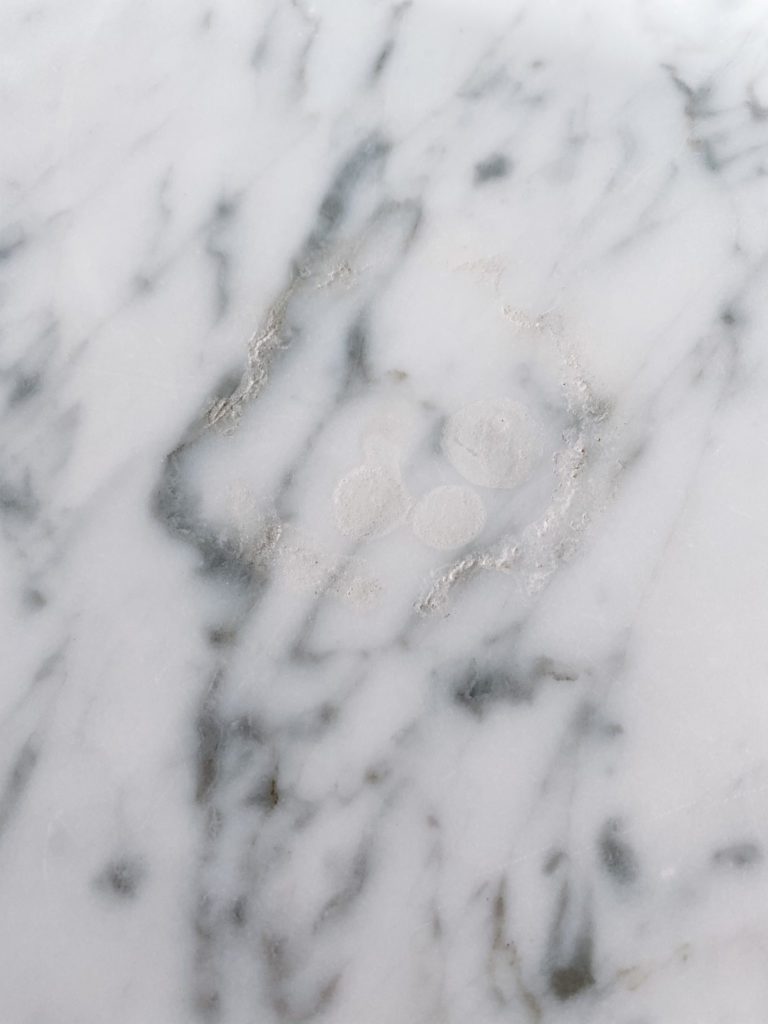
The worst etching on our countertop is from a vase! I had placed a vase of flowers on the island and added the citric acid growing solution packet to the water. I discovered hours later that the vase was purely decorative and not meant to hold water so it melted. The acid water from the flowers leached through and ate into the counter for several hours before I noticed what was happening. It left the etch to end all etches (see the image above)!
# 2 PRICE
It may not be the most expensive stone on the market, but it’s still stone and therefore much more expensive than laminate, butcher block etc.. Really think about your budget and shop around to get the best price. Sometimes manufacturers will have remnants from large jobs and if you have a small space you can get these pieces at highly discounted prices.
Are Marble Countertops Right For You?
The answer to the question “Should you choose marble countertops” is of course dependant on personal preference, budget, intended use etc…
If I had to make the choice again I would choose marble in a heartbeat! The etches can barely be seen unless the sun is shining on the counter from a specific direction. The scratches aren’t that noticeable. And after a decade we don’t have any major stains and only a few chips. For the first year or so I worried about every tiny scratch and drop of spilled orange juice (I’m pretty sure I drove my family nuts!) But as time went on I worried less about the little imperfections and enjoyed the natural aging process and daily use of such a beautiful stone.
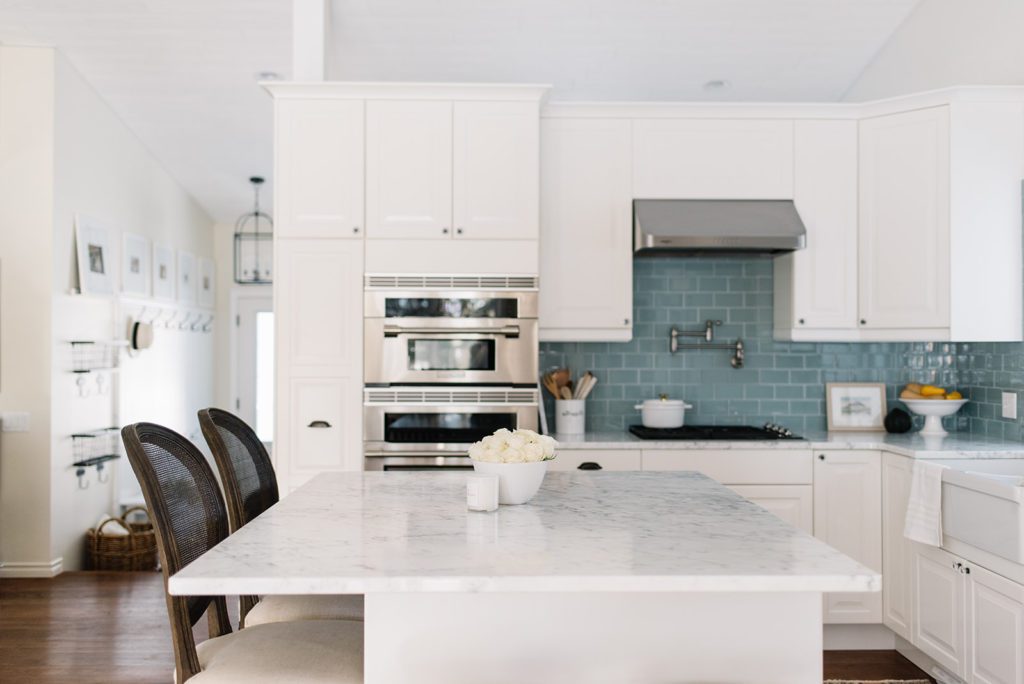
There truly is nothing quite as beautiful as marble when it comes to natural stone. If you require a utilitarian countertop that is extremely durable and requires very limited maintenance (in a rental property for example), marble may not be what you need. For most other installments I would say go with your heart, embrace the imperfections and enjoy for years to come. To the question “Should you choose marble countertops?” my answer is a resounding yes!
MORE GOOD READS:
Leave a Reply Cancel reply
This site uses Akismet to reduce spam. Learn how your comment data is processed.
learn more...
shop favourites
HOME interior
HOME EXTERIOR
AMANDA's style
fall
WINTER
I'm Amanda and I’m passionate about creating a well loved and well lived in home for my family and I'd love to help you do the same!
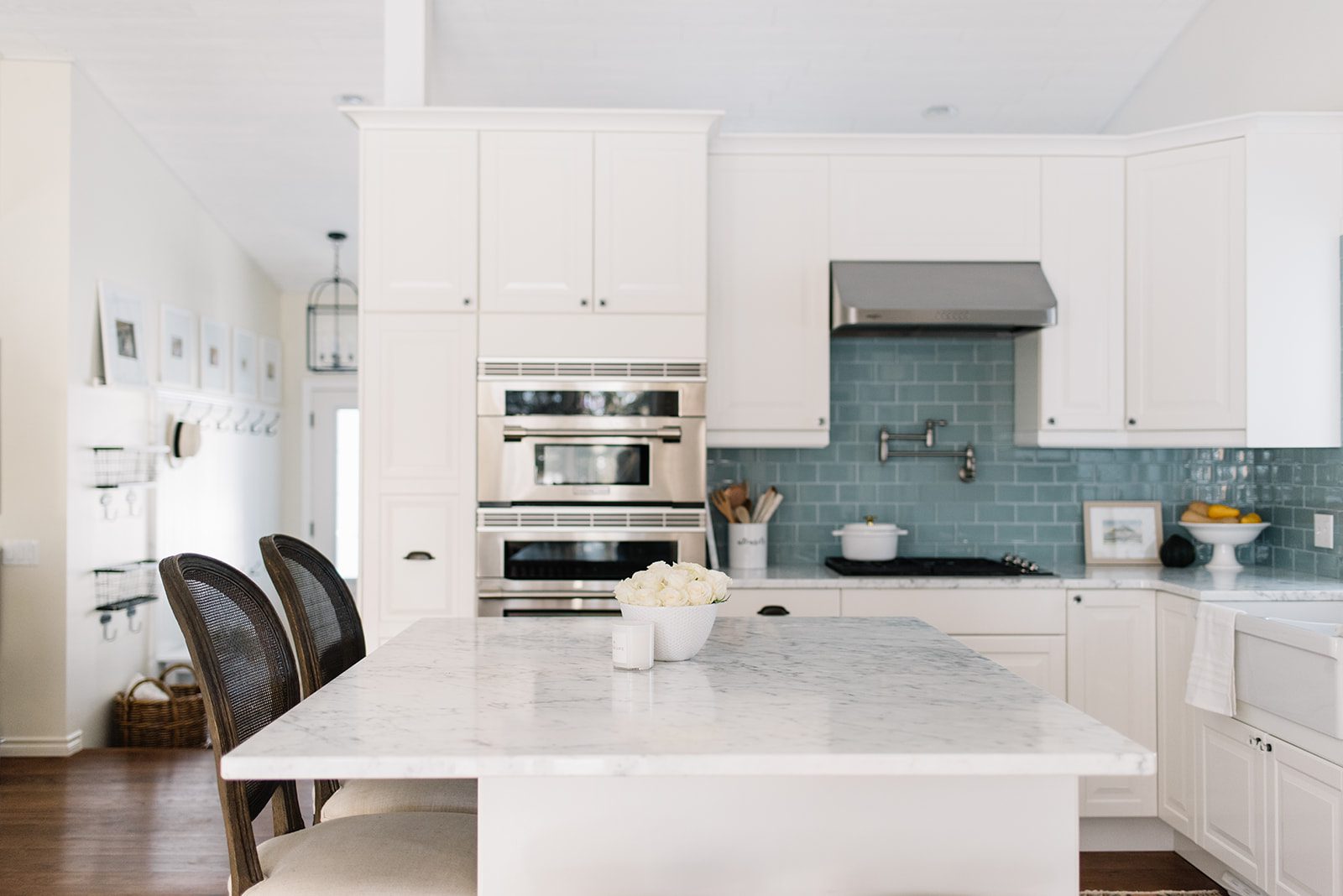
I learned some great stuff here! Thank you for sharing this!
I’m so glad! Thanks for reading!
Do you seal your counter tops? if so what products do you recommend and how often?
Thanks for the review – it really helped me!
Hi! So I actually stopped sealing my countertops. The chemicals in them are so strong. I just use Thieves household cleaner to spray clean. Seems to be working fine! But I don’t let anything that might stain sit for long!